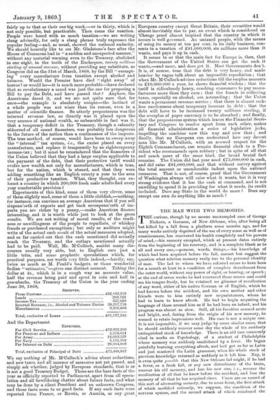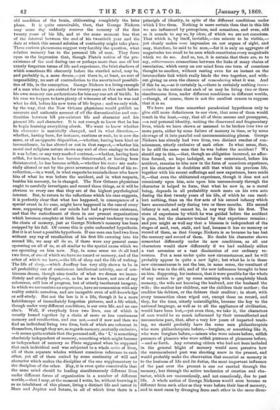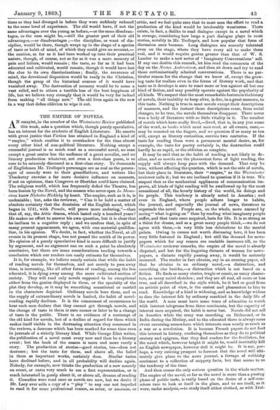THE MAN WITH TWO MEMORIES.
THE curious, though by no means unexampled case of George Nickern, a German, of New .Orleans, who, after being all but killed by a fall from a platform some months ago, and for many weeks entirely deprived of the use of every sense as well as of consciousness, has recovered his health completely and his powers. of mind,—his memory excepted, which at present dates entirely from the beginning of his recovery, and is a complete blank as toall and every one,—persons, words, things,—his knowledge of which had been acquired before the fall, cannot but suggest the question what relation memory really has to the personal identity of man. The lad to whom we have referred seems to have been for a month at least in a condition of complete detachment from the outer world, without any power of sight, or hearing, or speech ; at the end of seven weeks be had recovered these senses and could use his tongue freely, but he retained no glimmer of recollection of any word, either of his native German or of English, which he had known before the accident, and his own mother and other friends were to him entirely new acquaintances, whom he had to learn to know afresh. Ile had to begin acquiring the language of those around him as if he had been an infant, and his progress was almost as slow. Still, all his faculties seemed acute and bright, and, dating from the origin of his new memory, he seemed to retain impressions well. Ills case is not a unique one. It is not impossible, if we may judge by some similar cases, that he should suddenly recover some day the whole of his suddenly extinguished stock of knowledge. There is an old case commonly cited in works on Psychology, of a student of Philadelphia whose memory was suddenly annihilated by a fever. He began painfully learning everything afresh, and had got as far as Latin
and just mastered the Latin grammar, when his whole stock of
previous knowledge returned as suddenly as it left him. Nay, it is even quite possible that this New Orleans lad might, if he had
a fever, or a fresh fall, or any new disturbance of the brain,
recover his old memory, and lose his new one, i. e., recover the recollection of all that lie knew before the accident, and lose the
memory of all that be has acquired since. Cases are on record of this sort of alternating memory, due to some fever, the first attack of which modified seriously, we suppose, the condition of the nervous system, and the second attack of which reinduced the old condition of the brain, obliterating completely the later phase. It is quite conceivable, then, that George Nickern may some day suddenly recover the memory of the first twenty years of his life, and at the same moment lose that of the interval between the end. of his twentieth year and the date at which this second solution of continuity might take place. These curious phenomena suggest very forcibly the question, what relation memory has to the personal life of. men. They force upon us the impression that, though Plato's notion of the preexistence of the soul during one or perhaps more than one all but utterly forgotten teams of life and experience, the faint shadows of which sometimes flit obscurely before the startled mind, may be, and probably is, a mere dream,—yet there is, at least, no sort of impossibility, no sort of contradiction to the ascertained possibilities of life, in the conception. George Nickern is a living example of a man who has pre-existed for twenty years on this earth before his own memory can authenticate for him any one act of his life. In his case we happen to have plenty of witnesses of what he was and what he did, before his new term of life began ; and we only wish, by the way, that the New Orleans physicians would publish an accurate and authentic account of all the discontinuities and continuities between hl pre-existent life and character and his present life and character. It is not enough to know that he has to begin learning everything afresh. We want to know whether his character is materially changed, and in what direction,-whether, having been, for instance, cautions or rash, he is now the same, or of an opposite disposition,—whether, having been kind or inconsiderate, he has altered or not in that respect,—whether his moral and religious nature shows any sort of close analogy to what it was before, or any very marked contrast,—whether, having been selfish, for instance, he has become disinterested, or having been disinterested, he has become selfish,—whether his tastes are materially altered or not by the great severance of the thread of his recollection,—in a word, in what respects he reminds those who knew him of what he was before the accident, and in what respects, besides his memory, he is changed. The New Orleans physicians ought to carefully investigate and record these things, as it will be obvious to every one that they are of the highest psychological interest. But, to return to the reflections which his case suggests, it is perfectly clear that what has happened, in consequence of a special event in his case, might have happened in the case of every man, supposing that all our minds had had a previous existence, and that the embodiment of them in our present organizations which becomes complete at birth had a universal tendency to snap the chain of memory, just as George Nickern's memory has been snapped by his fall. Of course this is quite unfounded hypothesis. But it is at least a possible hypothesis. If one man can lead two lives without any ray of recollection of his first life entering into his second life, we may all do so, if there were any general cause operating on all of us, at all similar to the special cause which we see operating on him now. Nay, in some sense we do all lead two lives, of one of which we have no record or memory, and of the other of which we have,—the life of sleep and the life of waking. The life of sleep,—which Jouffroy has very ably shown to be in all probability one of continuous intellectual activity, one of continuous dream, though nine-tenths of what we dream we immediately and utterly forget,—is, as far as we know, not one of any coherence, still less of progress, but of utterly incoherent imagery, in which we accumulate no experience, have no communion with any reality outside ourselves, and are incapable even of self-knowledge or self-study. But not the less is it a life, though it be a mere kaleidoscope of immediately forgotten pictures, and a life which, though under very different conditions, is our own life, and no one else's. Well, if everybody lives two lives, one of which is usually bound together by a chain of more or less continuous memory and recollection, and one not,—and if now and then we find an individual living two lives, both of which are coherent in themselves, though they are, as regards memory, mutually exclusive, —it seems quite certain that the personal self, the 'I,' is something absolutely independent of memory, something which might become as independent of memory as Plato suggested when he supposed that each individual soul was subjected to a whole series of liveF, all of them separate wholes without conscious reference to each other, yet all of them united by some continuity of will and character which makes the discipline of the one supplementary to the discipline of the other. Nay, it is even quite conceivable that the same mind should be leading simultaneously different lives under different forms of organization in a number of different worlds,—that I may, at the moment I write, be, without knowing it as an inhabitant of this planet, living a distinct life and career in Mars and Jupiter and Saturn, in all of which lives there is a
principle of identity, in spite of the different conditions under which I live them. Nothing is more certain than that in this life we are influenced by perceptions, and sensations, and even, odd as it sounds to say so, by ideas, of which we are not conscious. That which is, by itself, invisible,—too minute to be visible.— yet clearly makes some impression on our organs of sight, and may, therefore, be said to be seen,—for it is only an aggregate of magnitudes too small to be seen which constitutes every magnitude which we do see. And so, too, it is certain that there are, so to say, subterranean connections between the links of many chains of association, which carry on our mind from one term of conscious thought to another, without resting even for an instant on the intermediate link which really binds the two together, and without giving us even the chance of remembering what it was. And if this be so,—as it certainly is,—there is certainly nothing inconceivable in the notion that each of us may be living two or three simultaneous lives, under different conditions in different worlds, —though, of course, there is not the smallest reason to suppose that it is so.
We have put these somewhat paradoxical hypotheses only to give still more definiteness to our view, that none of them would touch in the least,—nay, that all of them assume and presuppose, —a real personal identity, uniting the dissevered and fragmentary lives, which we have shown or assumed to be broken into two or more parts, either by some failure of memory in time, or by some cleavage of it into parallel and uncommunicating planes. George Nickern has already had two lives, two distinct reaches of consciousness, utterly exclusive of each other. In what sense, then, is he still the same man that he was before the accident ? We should say in this,—that, though no obligation incurred, no affection formed, no hope indulged, no fear entertained, before his accident, remains to him now in the form of conscious experience, yet his character is doubtless still that which his previous life, together with his recent sufferings and new experience, have made it,—that even the obliterated experience, though it does not act consciously upon him, acts upon him unconsciously through the character it helped to form, that what he now is, as a moral being, depends in all probability much more on his own acts during the first twenty years of his life, of which he can recollect nothing, than on the few acts of his second infancy which have accumulated only during two or three months. His second infancy is not, and cannot be, in any way like his first. The store of experience by which he was guided before the accident is gone, but the character trained by that experience remains ; and you might as well say that a blossom is independent of the stages of seed, root, stalk, and leaf, because it has no memory or record of them, as that George Nickern is so because he has lost the memory and record of them. No doubt his character shows somewhat differently under its new conditions, as all our characters would show differently if we had suddenly either a vast accession or a vast diminution of our ordinary resources. Put a man under quite new circumstances, and he will probably appear in quite a new light ; but what he is in these new circumstances is not the leas, in some sense, the resultant of what he was in the old, and of the new influences brought to bear on him. Supposing, for instance, that it were possible for the whole of any nation to get up some morning with a completely blank memory, the wife not knowing the husband, nor the husband the wife ; the mother her children, nor the children their mother ; the creditor his debtors, or the debtors their creditor ; in short, with every transaction clean wiped out, except those on record, and they, for the time, utterly unintelligible, because the key to the national language, as well as to all the appliances of civilization, would have been lost,—yet even then, we take it, the characters of men would be so much influenced by their unrecollected and unconscious past, that, after a very few years of imparted teaching, we should probably have the same men philanthropists who were philanthropists before,—burglars, or something like it, who were burglars before,—misers who were misers before, selfish pursuers of pleasure who were selfish pursuers of pleasures before, —and so forth. Any returning citizen who had not been included in the general blight of memory would soon perceive how the unremembered past was shooting anew in the present, and would probably make the observation that essential as memory is to the business of life and its duties, the most important influence of the past over the present is one not exerted through the memory, but through the active tendencies of emotion and character, which are unconsciously, and not consciously, due to past life. A whole nation of George Nickerns would soon become as different from each other as they were before their loss of memory, and in most cases by diverging from each other in the same dime tions as they had diverged in before they were iuddenly reduced to the same level of experience. The old would have, if not the same advantages over the young as before,—or the same disadvantages, as the case might be,—atill the greater part of their old advantages,—or disadvantages ;—the discipline, or want of discipline, would be there, though wrapt up in the shape of a species of taste or habit of mind, of which they could give no account,-,-the caution, so far as it had been worked up into their practical nature, though, of course, not so far as it was a mere memory of pain and failure, would remain ; the taste, so far as it had been educated and cultivated, would remain, though it would have lost the clue to its own discriminations ; finally, the reverence of mind, the devotional disposition would be ready in the Christian, though the grasp of the historical sources of it would have vanished away. The destruction of memory would be to some a vast relief, and to others a terrible loss of the best happiness of life, but we believe very strongly that it would be very far indeed from making "all things new." The old lives again in the new in a way that defies oblivion to wipe it out.




































 Previous page
Previous page